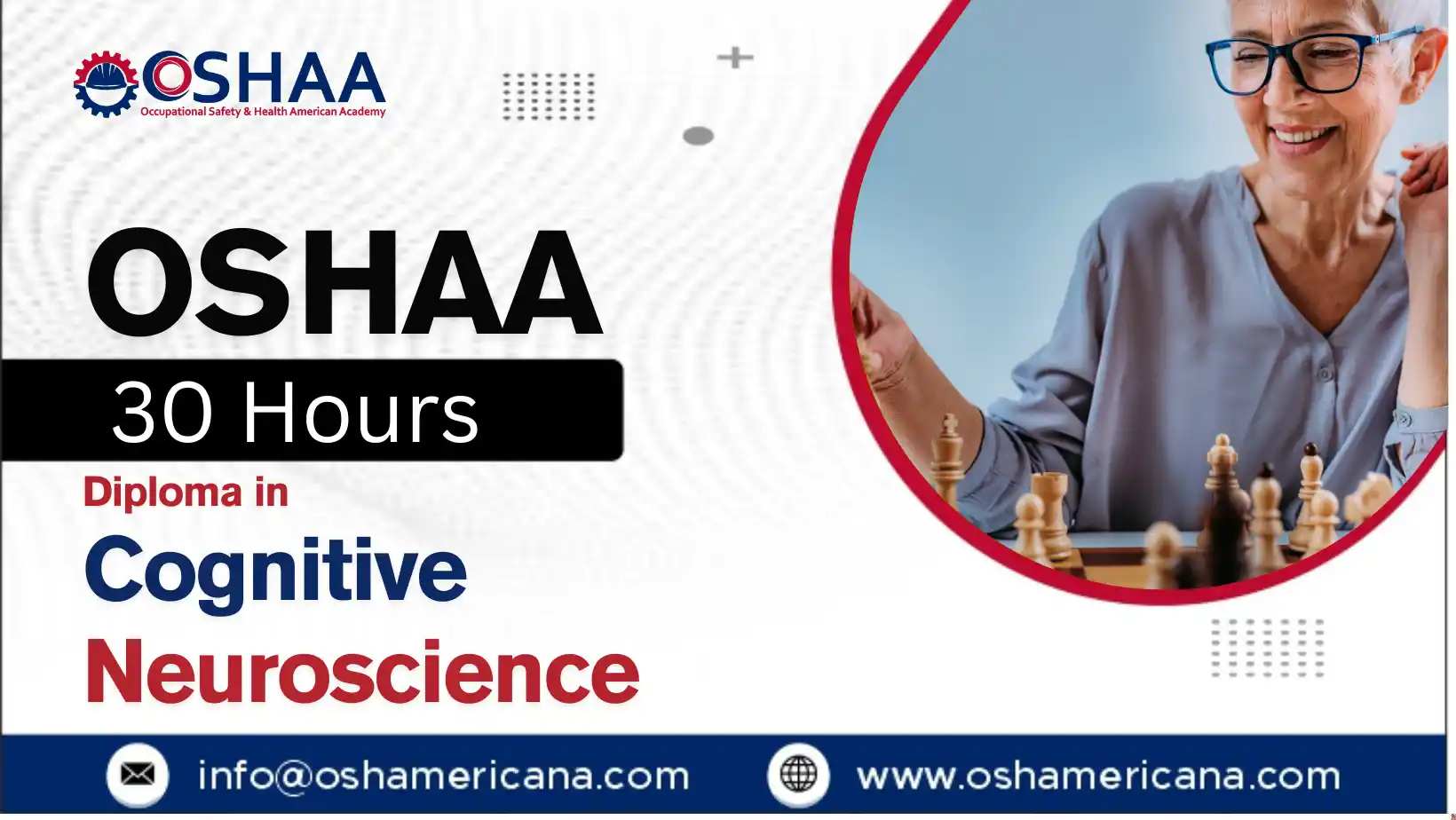Cognitive neuroscience stands at the intersection of psychology and biology, offering critical insights into how the brain enables perception, memory, decision-making, and emotional regulation. The OSHAA 30-Hours Professional Diploma in Cognitive Neuroscience has been carefully developed to introduce participants to the fundamental principles, theories, and applications of this exciting and rapidly advancing field.
This programme provides a comprehensive foundation in brain-behaviour relationships, equipping participants with both scientific knowledge and practical understanding. With increasing demand for neuroscience-informed approaches in healthcare, education, therapy, and technology, this diploma serves as a valuable step towards personal and professional development.
Cognitive neuroscience investigates how cognitive processes—such as attention, language, memory, and problem-solving—are linked to the structure and function of the brain. Through this diploma, participants will explore the mechanisms underlying conscious thought, sensory perception, learning, and social behaviour. The course bridges foundational knowledge in neurobiology with key areas of cognitive psychology, offering an integrated perspective on how the brain enables the mind.
The OSHAA 30-Hours Professional Diploma in Cognitive Neuroscience offers a timely and accessible opportunity to explore the science of the brain and mind. With a clear focus on real-world relevance and scientific integrity, the programme empowers participants to apply cognitive neuroscience in diverse settings, from clinical environments to education, research, and technology. Whether for career advancement or intellectual curiosity, this diploma provides essential knowledge for those looking to better understand how the brain shapes human experience.
OSHAA 30-Hours Professional Diploma in Cognitive Neuroscience
Study Units
Learning Outcomes
Foundations of Cognitive Neuroscience and Brain Function (3 hours)
- Understand the scope, history, and interdisciplinary nature of cognitive neuroscience
- Identify the major goals and applications of cognitive neuroscience in research and practice
- Explore how brain function relates to cognitive processes such as perception, memory, and reasoning
- Recognise key research approaches used to study brain-behaviour relationships
Structure and Functional Organisation of the Brain (3 hours)
- Identify major brain regions and their roles in cognitive processing
- Understand the division between cortical and subcortical structures
- Explain the lateralisation of brain function and its relevance to language and cognition
- Recognise how structural organisation supports functional specialisation
Neural Mechanisms of Sensory Perception (6 hours)
- Understand how sensory information is processed by the nervous system
- Explore the neural pathways involved in vision, hearing, touch, taste, and smell
- Analyse how the brain integrates sensory input to produce coherent perceptual experiences
- Recognise perceptual disorders and their underlying neural causes
- Evaluate how attention and experience influence perceptual processing
- Apply knowledge of sensory systems to real-world cognitive challenges
Attention, Focus, and Cognitive Control (3 hours)
- Describe the neural systems involved in attention and cognitive control
- Understand selective attention, divided attention, and attentional shifting
- Explore how the brain manages goal-directed behaviour and task-switching
- Examine disorders of attention and the neural disruptions they involve
Memory Systems and Learning Processes (4 hours)
- Distinguish between different types of memory (working, short-term, long-term)
- Understand the brain structures involved in memory formation, storage, and retrieval
- Explore the neural mechanisms behind learning and memory consolidation
- Analyse how memory processes can be disrupted in neurological conditions
Language Processing and Neural Communication (4 hours)
- Understand the neural basis of language production and comprehension
- Identify key brain areas involved in speech, reading, and written communication
- Explore the relationship between brain lateralisation and language function
- Recognise language disorders and their neurological origins
Decision-Making and Executive Function (3 hours)
- Define executive functions and their role in planning, reasoning, and problem-solving
- Examine the prefrontal cortex’s involvement in decision-making processes
- Understand the impact of emotion, reward, and risk on cognitive decisions
- Analyse impairments in executive function due to brain injury or disorder
Emotion and the Brain: Affective Neuroscience (3 hours)
- Understand the brain structures involved in emotional regulation, including the amygdala and prefrontal cortex
- Explore how emotions influence cognitive functions such as memory and attention
- Analyse the neural basis of mood disorders and emotional dysregulation
- Examine how the brain processes fear, reward, attachment, and empathy
Course Benefits – OSHAA 30-Hours Professional Diploma in Cognitive Neuroscience
- Provides a clear and structured understanding of how brain function underpins cognition, behaviour, and emotion
- Equips participants with neuroscience-based insights applicable to psychology, healthcare, education, and research
- Enhances critical thinking by integrating biological, psychological, and behavioural perspectives
- Develops the ability to interpret and apply findings from cognitive neuroscience in real-world settings
- Supports evidence-informed approaches to learning, therapy, communication, and decision-making
- Improves understanding of common cognitive and neurological disorders and their neural correlates
- Builds foundational knowledge for further academic study or specialisation in neuroscience or cognitive science
- Offers a professional edge in roles requiring neurological awareness, such as mental health, speech and language support, or human-computer interaction
- Increases confidence in reading, evaluating, and applying neuroscience literature in professional contexts
- Delivers a recognised credential that adds value to CVs and professional development portfolios across multiple sectors
This course is designed for participants who wish to explore the relationship between brain function and human cognition. It is especially relevant for:
- Psychology professionals and graduates seeking to deepen their understanding of brain-based cognitive processes
- Educators and learning support specialists interested in the neuroscience of learning, memory, and attention
- Healthcare and mental health practitioners working with individuals affected by cognitive or neurological conditions
- Speech and language therapists aiming to enhance their knowledge of language processing and neural communication
- Researchers or research assistants preparing for further study or involvement in cognitive or neuropsychological research
- Professionals in technology, UX design, or artificial intelligence seeking a neuroscience-informed perspective on human decision-making
- Participants with a general interest in brain science and its application to real-world behaviours and challenges
The course is suitable for those from both clinical and non-clinical backgrounds who wish to gain scientifically grounded knowledge of the brain’s role in cognition, learning, and behaviour.







